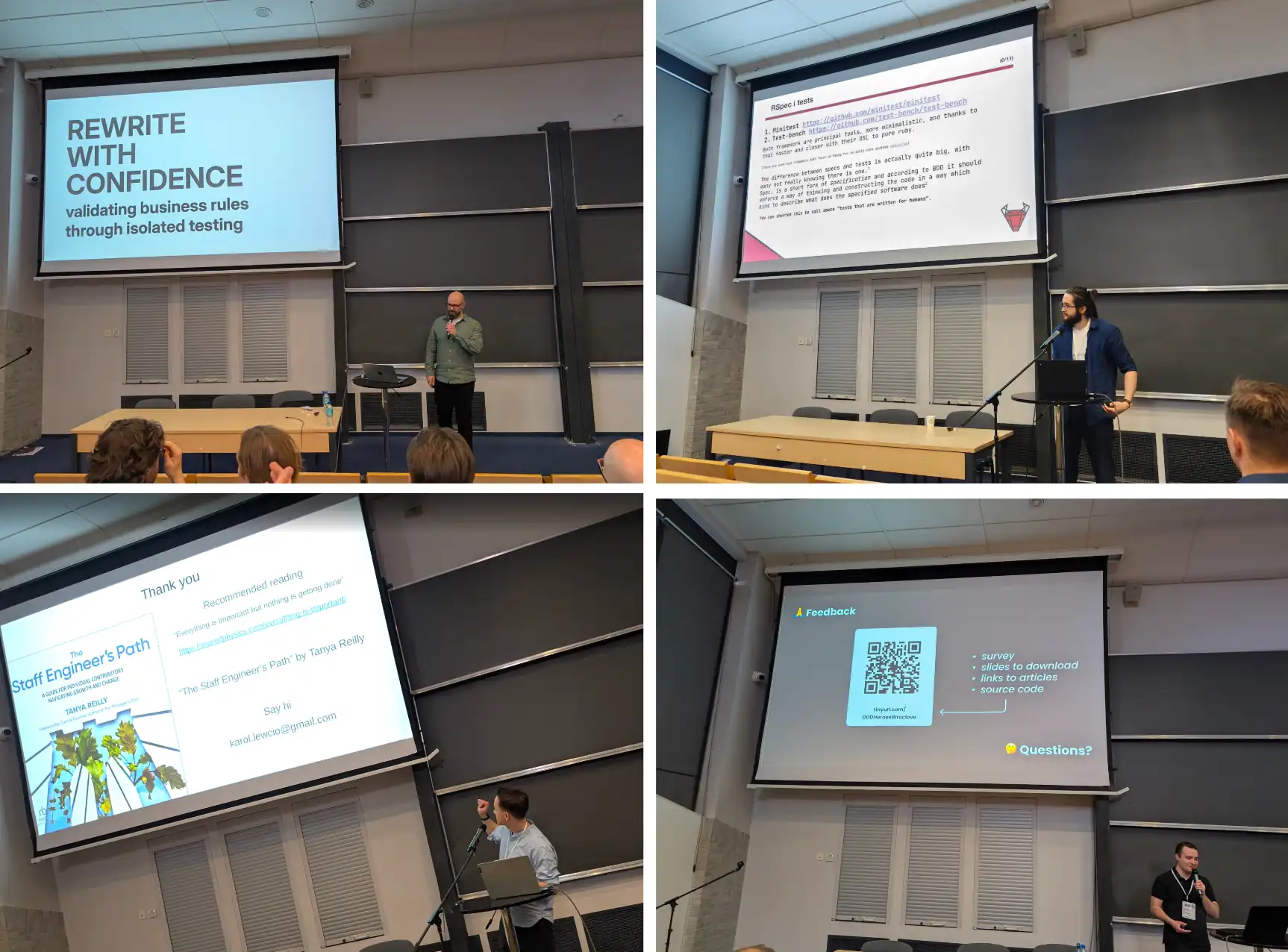During the weekend of April 11–13, together with Czarek and Witek, and I was lucky to visit a great city, attend a fantastic conference, and meet amazing people. Our trip to Wrocław and the wroclove.rb conference was definitely one of those memorable adventures. If you don’t know, it’s one of the top Polish Ruby conferences, held in Wrocław, right in the heart of the Computer Science department at the University of Wrocław. We even got to feel like students again and enjoy great talks in that classic university atmosphere, which I personally love!
Everything started on Friday at 14:00 with workshops on two of the hottest topics: Hotwire and AI. In From Static to Reactive: Hotwire Basics for Rails Devs, Maciej Korsan and Łukasz Reszke showcased the magic of Hotwire. In the Vector Image Search workshop, Chris Hasiński guided us through the adventure of creating a custom image search engine. It’s amazing how fast you can build it when you have such great support.

But the workshops weren’t the only thing on Friday. We also kicked off the day talks. First, Joel Drapper showed us that Ruby has literally always had types and his literal gem. Then Chris Hasiński explained to us how generating next token is behind AI we see in his talk Next Token! After that flood of knowledge, we went to the first afterparty, where we had the chance to meet new people as well as catch up with those we already knew, and discuss the events of the first day.

On Saturday, we started with a great talk by John Gallagher, who told us how to Fix Production Bugs 20x Faster - The Power of Structured Logging. I had the opportunity to see this talk before at the Ruby Community Conference, but the second time, it made the same great impression. If you didn’t have this opportunity, I think it’s a must-have for every developer. Next, we got a huge portion of inspiration from Stephen Margheim, our guide On the tasteful journey to Yippee. We heard about the philosophy and needs behind creating this new framework. We got many promises, and now we need to wait for it to create our first Yippee apps! You can guess (or see on video) which database will be important there. The first part of that day ended with the No ‘Pundit’ Intended talk by Yatish Mehta where he shared his insights on authorization and advised us to start simple with Pundit, then add Granity for FGA authorization, and when you reach a distributed system, go for Authorization as a Service.

The second part of the day began with an adventure titled Rewrite with confidence: validating business rules through isolated testing by Szymon Fiedler. In his talk, we explored techniques to test complex business logic in isolation to enable safe and confident refactoring. Then, we moved on to Might & Magic of Domain-Driven Design through the Lens of Heroes III by Mateusz Nowak. He illustrated the principles of Domain-Driven Design (DDD) by drawing parallels between the game mechanics of Heroes III and software architecture, offering valuable insights into event modeling. Last but not least, the incredible talk about the Gregorian Calendar - Lessons Learned Maintaining a 3000-Year-Old Codebase, where Norbert Wójtowicz told us how the ancient Romans impacted our calendar and why it’s such a problematic case in code. After that, we enjoyed 10 great lightning talks and then went to the second afterparty, where we discussed all the new things we had heard. I believe there aren’t many Ruby conference afterparties where people talk about calendars and setting SQLite as the only choice in the new Ruby framework.

The last day started with talk where Chikahiro Tokoro asked us, Is the monolith a problem? and proceeded to explain why it’s not by highlighting the issues with God Objects. Seth Horsley presented Building Beautiful UIs with Ruby: A Rails-Native Approach, where he introduced RubyUI components that simplify UI creation. He demonstrated how this approach can create clean, responsive interfaces while maintaining development speed and flexibility. Then, we had the incredible opportunity to hear Wojtek Wrona share his talk From PostgreSQL to SQLite in Rails: Our Migration Journey, Challenges, and Lasting Trade-Offs, a story from the person who did the migration and dealt with the challenges. Finally, in That’s Not So Bad After All, Adam Piotrowski shared seven real-world situations, each with valuable lessons we can all learn from. From dealing with unexpected integration problems to managing client expectations and avoiding common development mistakes. Through these stories, he highlighted the importance of proactive communication, proper planning, and being prepared for the unpredictable nature of working with legacy systems and third-party services.

So what was Wroclove.rb? It was a really great way to spend a spring weekend in beautiful Wrocław, learning a lot, taking part in many inspiring conversations, and meeting amazing people who also love Ruby. Big thanks to the organizers, awesome job! See you all next year, April 17–19.





























